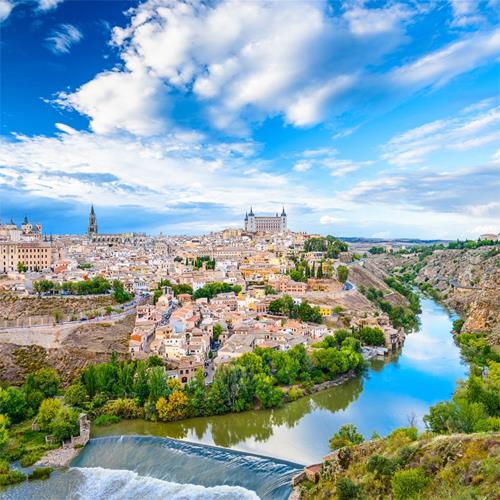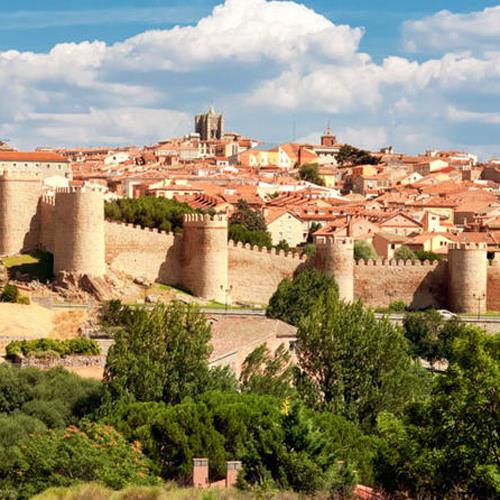


The historic cities near Madrid, Spain`s vibrant capital, offer some of the world’s most historic and unique sights. Many of Spain`s oldest universities, cathedrals, monasteries, and historic monuments are located here. Medieval architecture, Roman monuments, palaces, and unique hanging houses are just a train or a car ride away from Madrid, in such cities as Leon, Burgos, Valladolid, Salamanca, and Avila in Castile and Leon; Toledo and Cuenca in Castilla-La Mancha; and Caceres and Merida in Extremadura.
Lively, energetic, and vibrant, you won`t find any other place in the world like Madrid. Capital of Spain since 1562, Madrid's museums host, among others, works by Dali, Miro, and Picasso`s Guernica. Madrid boasts art galleries, large open lush gardens, streets lined with Spain`s best tapas bars and a city atmosphere that never dwindles no matter the time of day!
Barcelona, Spain`s second city, is on the cutting edge of fashion, architecture, food, style, and good times. Its most powerful monuments are the intricately carved edifices of the Gothic Quarter; the Catalan Art Nouveau modernism that inspired Antoni Gaudí's Basilica de la Sagrada Familia; and the seminal surrealist works of Pablo Picasso and Joan Miro.
Valencia, Spain`s third-largest city and capital of the Valencian Community, can boast a very rich history, one that has spanned two full millennia. Twice the former capital of Spain, Valencia`s rich history is evident in the Ciutat Vella (Old Town), one of the largest old towns in Europe, which houses buildings that date back to the Moorish invasion and Roman-era plazas.
Central Spain contains some of the last great unexplored areas, as well as some of its most glorious architectural and historic treasures. Mile upon mile of empty roads lead you from one to another of the great cities and forgotten villages. This Spanish heartland is a mountainous region where wildlife flourishes and the mid-summer sun bakes the land.
Andalucia, comprising much of southern Spain, is a land of culture, history, fiestas, and excellent food, featuring outstanding monuments and gorgeous natural landscapes. It is home to Granada and the Alhambra Palace; Cordoba and the Mezquita; Seville with its Cathedral and Alcázar; and popular festivals such as the Carnival in Cadiz and the April Fair in Seville.
Stretching over 200 miles from Almeria to Tarifa, with wide sweeps of golden sand, white-washed villages, excellent golf, alfresco dining, fantastic warm weather year-round, a wide variety of outdoor activities and some spectacular scenery make the Costa del Sol one of Spain`s most popular tourist destinations. Come experience this gem for yourself!
A well-kept secret that is unspoiled by mass tourism, the Costa de la Luz offers wide, sandy beaches backed by dunes and pine forests, watched over by ancient white hilltowns dating back to Moorish times. The Costa de la Luz gets its name from the brilliant, vivid light that highlights the whitewash of its villages, the golden dunes and silver sea`s reflection.
The Costa de Almería is perhaps the most diverse and unspoiled of the costas, with over 125 miles of diverse and predominantly natural coastline with everything from popular resorts to rocky coves and naturalist beaches. Plus inland desert landscapes and the most pure and intense light! A light which gives Almería the highest number of daylights hours in the world.
Rich in history, dating back to the Romans and Moors, Spain`s white villages offer historical castles and ruins with incredible views. Take a step back in time, unwind and enjoy a stroll along their labyrinths of narrow, decorative clean streets, savor local food, breathe in the pure unspoiled mountain air, and take countless photos!
Jerez de la Frontera, Sanlucar de Barrameda and El Puerto de Santa María form a triangle of generous land where the vine has reigned from time immemorial. The Sherry Triangle represents the only geographical location in the world where sherry can be produced legally. It is also a place of exceptional beauty, beautiful beaches and dancing horses!
The Green Coast, or Green Spain, is the beautifully lush area in the extreme north of Spain, consisting of Galicia, Asturias, Cantabria, and the northern part of the Basque Country, all of which receive more rain than the rest of the country. Verdant and forested mountains contrast with the nearby coastline and its blue-green waters.
The Spanish Empire dates from 1492, and by 1516, the Kingdoms of Castile, Aragon, Navarre, and others were united under the Spanish crown. This is in addition to other storied kingdoms which existed pre-1516 in Spain`s current borders, such as Galicia, Leon, and the Almohad Caliphate. The cities in these regions are filled with thousands of years of history.
Spanish cuisine is very flavorful, and is a quintessential Mediterranean diet, befitting the world`s largest olive oil producer. Spain`s former colonies all over the world influenced the cuisine at home, in everything from tomato sauce to saffron. Today, the various regional staple delicacies represent history and tradition.
Tens of millions of people visit Spain each year, and many combine its picturesque cities, such as Madrid, with some of the most popular and beautiful beaches in the world. Whether you`re sunning yourself on the Mediterranean Costas, the Bay of Biscay shoreline, or on one of Spain`s gorgeous islands, you will find a vacation best suited to your needs.
About four hours by car from Madrid, Logroño is the charming capital of the La Rioja region. The visitor will enjoy the local hospitality and the world-famous taste of the local Rioja wine. If you happen to be here at Christmastime, don't miss the life-size reconstruction of Biblical scenes in the town square.
Ernest Hemingway put Pamplona on the map by describing the famed `running of the bulls`. In order to participate in the popular Fiesta de San Fermín, which ends in fireworks, live music, and wine, visit in July. Once a fortified city and the capital of the ancient kingdom of Navarre, Pamplona is more than a one-event town.
Zaragoza, the capital of Aragon, is located on the banks of the Ebro River, halfway between Madrid and Barcelona. With its 2,000-year history, Zaragoza offers a stunning legacy of monuments in the streets of the city, vestiges of the Roman, Moorish, Jewish and Christian communities who left their mark on the city.